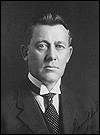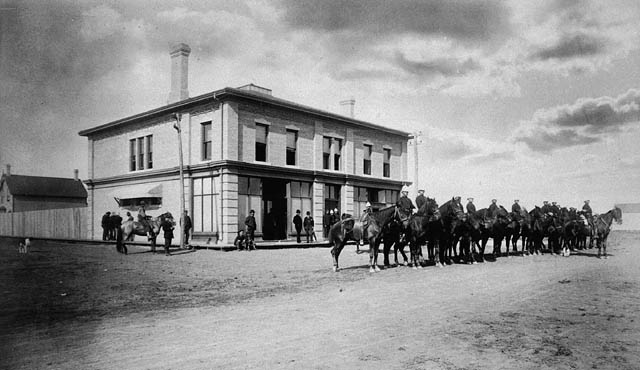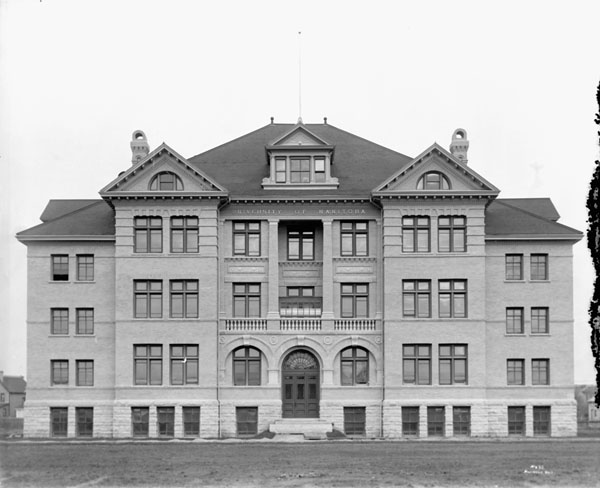|
James Fraser Bryant
James Fraser Bryant (May 19, 1877 – September 18, 1945) was a lawyer, judge and political figure in Saskatchewan, Canada. He represented Lumsden (provincial electoral district), Lumsden in the Legislative Assembly of Saskatchewan from 1929 to 1934 as a Conservative Party of Saskatchewan, Conservative. He was born in Mapleton, Ontario, Glen Allan, Ontario, the son of Reverend James Bryant and Dora McGill, and was educated at Upper Canada College, Queen's University at Kingston, Queen's University and the University of Manitoba. He articled in law in Regina, Saskatchewan, was called to the bar in 1906 and set up practice in Regina. In 1908, he married Mabel Myra Boyd. Bryant served as chairman of the Regina public school board and president of the Saskatchewan School Trustees. He ran unsuccessfully for a seat in the Saskatchewan assembly in 1925. He served briefly as Speaker of the Legislative Assembly of Saskatchewan in September 1929. Bryant was Minister of Public Works, and ... [...More Info...] [...Related Items...] OR: [Wikipedia] [Google] [Baidu] |
Saskatchewan
Saskatchewan ( ; ) is a Provinces and territories of Canada, province in Western Canada, western Canada, bordered on the west by Alberta, on the north by the Northwest Territories, on the east by Manitoba, to the northeast by Nunavut, and on the south by the United States, U.S. states of Montana and North Dakota. Saskatchewan and Alberta are the only landlocked provinces of Canada. In 2022, Saskatchewan's population was estimated at 1,205,119. Nearly 10% of Saskatchewan’s total area of is fresh water, mostly rivers, reservoirs and List of lakes in Saskatchewan, lakes. Residents primarily live in the southern prairie half of the province, while the northern half is mostly forested and sparsely populated. Roughly half live in the province's largest city Saskatoon or the provincial capital Regina, Saskatchewan, Regina. Other notable cities include Prince Albert, Saskatchewan, Prince Albert, Moose Jaw, Yorkton, Swift Current, North Battleford, Melfort, Saskatchewan, Melfort, and ... [...More Info...] [...Related Items...] OR: [Wikipedia] [Google] [Baidu] |
Executive Council Of Saskatchewan
The Executive Council of Saskatchewan (informally and more commonly, the Cabinet of Saskatchewan) is the cabinet of that Canadian province. Almost always made up of members of the Legislative Assembly of Saskatchewan, the Cabinet is similar in structure and role to the Cabinet of Canada while being smaller in size. As federal and provincial responsibilities differ there are a number of different portfolios between the federal and provincial governments. The Lieutenant-Governor of Saskatchewan, as representative of the King in Right of Saskatchewan, formally heads the council. The lieutenant-governor does not normally attend its meetings and in practice the Premier of Saskatchewan is its most powerful member. (However, many of its documents are referred to as being issued by the Governor-in-Council.) Other members of the Cabinet, the ministers, are selected by the Premier of Saskatchewan and appointed by the Lieutenant-Governor. Most cabinet ministers are the heads of ministries, ... [...More Info...] [...Related Items...] OR: [Wikipedia] [Google] [Baidu] |
1945 Deaths
1945 marked the end of World War II and the fall of Nazi Germany and the Empire of Japan. It is also the only year in which Nuclear weapon, nuclear weapons Atomic bombings of Hiroshima and Nagasaki, have been used in combat. Events Below, the events of World War II have the "WWII" prefix. January * January 1 – WWII: ** Nazi Germany, Germany begins Operation Bodenplatte, an attempt by the ''Luftwaffe'' to cripple Allies of World War II, Allied air forces in the Low Countries. ** Chenogne massacre: German prisoners are allegedly killed by American forces near the village of Chenogne, Belgium. * January 6 – WWII: A German offensive recaptures Esztergom, Kingdom of Hungary (1920–1946), Hungary from the Russians. * January 12 – WWII: The Soviet Union begins the Vistula–Oder Offensive in Eastern Europe, against the German Army (Wehrmacht), German Army. * January 13 – WWII: The Soviet Union begins the East Prussian Offensive, to eliminate German forces in East Pruss ... [...More Info...] [...Related Items...] OR: [Wikipedia] [Google] [Baidu] |
1877 Births
Events January–March * January 1 – Queen Victoria is proclaimed ''Empress of India'' by the ''Royal Titles Act 1876'', introduced by Benjamin Disraeli, the Prime Minister of the United Kingdom . * January 8 – Great Sioux War of 1876 – Battle of Wolf Mountain: Crazy Horse and his warriors fight their last battle with the United States Cavalry in Montana. * January 20 – The Conference of Constantinople ends, with Ottoman Turkey rejecting proposals of internal reform and Balkan provisions. * January 29 – The Satsuma Rebellion, a revolt of disaffected samurai in Japan, breaks out against the new imperial government; it lasts until September, when it is crushed by a professionally led army of draftees. * February 17 – Major General Charles George Gordon of the British Army is appointed Governor-General of the Sudan. * March – ''The Nineteenth Century (periodical), The Nineteenth Century'' magazine is founded in London. * Marc ... [...More Info...] [...Related Items...] OR: [Wikipedia] [Google] [Baidu] |
Judges In Saskatchewan
A judge is an official who presides over a court. Judge or Judges may also refer to: Roles *Judge, an alternative name for an adjudicator in a competition in theatre, music, sport, etc. *Judge, an alternative name/aviator call sign for a member of the Judge Advocate General's Corps, U.S. Navy *Judge, an alternative name for a sports linesman, referee or umpire * Biblical judges, an office of authority in the early history of Israel Places * Judge, Minnesota, a community in the United States * Judge, Missouri, a community in the United States * The Judge (British Columbia), a mountain in the Columbia Mountains of Canada People * Judge (surname) * Judge Jules, professional name of British DJ and record producer Julius O'Riordan Arts, entertainment, and media Fictional characters * Judge (Buffyverse), a demon in the television series ''Buffy The Vampire Slayer'' * Archadian Judges, from the game ''Final Fantasy XII'' * Judge Holden, from Cormac McCarthy's novel ''Bl ... [...More Info...] [...Related Items...] OR: [Wikipedia] [Google] [Baidu] |
Speakers Of The Legislative Assembly Of Saskatchewan
Speaker may refer to: Society and politics * Speaker (politics), the presiding officer in a legislative assembly * Public speaker, one who gives a speech or lecture * A person producing speech: the producer of a given utterance, especially: ** In poetry, the literary character uttering the lyrics of a poem or song, as opposed to the author writing the words of that character; see Character (arts) Electronics * Loudspeaker, a device that produces sound ** Computer speakers, speakers sold for use with computers ** Speaker driver, the essential electromechanical element of the loudspeaker Arts, entertainment and media * Los Speakers (or "The Speakers"), a Colombian rock band from the 1960s * ''The Speaker'' (periodical), a weekly review published in London from 1890 to 1907 * ''The Speaker'' (TV series), a 2009 BBC television series * "Speaker" (song), by David Banner * "Speakers" (Sam Hunt song), 2014 * ''The Speaker'', the second book in Traci Chee's Sea of Ink and Gold trilo ... [...More Info...] [...Related Items...] OR: [Wikipedia] [Google] [Baidu] |
1934 Saskatchewan General Election
The 1934 Saskatchewan general election was held on June 19, 1934, to elect members of the Legislative Assembly of Saskatchewan. The Liberal Party of Saskatchewan, Liberal Party of former List of premiers of Saskatchewan, Premier James Garfield Gardiner, James Gardiner was returned to power with a large majority – 50 of the 55 seats in the legislature – after the four year Conservative minority government interlude. After forming a coalition government to oust the Liberals from power after the 1929 Saskatchewan general election, 1929 election, James Thomas Milton Anderson, James T.M. Anderson's Progressive Conservative Party of Saskatchewan, Conservative government had tried to use anti-Roman Catholic Archdiocese of Regina, Catholic and anti-Fransaskois, French Canadian feeling in the province to win support. The Conservatives also had the support of the Ku Klux Klan in Canada, Ku Klux Klan, which was a significant force in the province at the time.Weedmark, Kevin"When the KKK ... [...More Info...] [...Related Items...] OR: [Wikipedia] [Google] [Baidu] |
1929 Saskatchewan General Election
The 1929 Saskatchewan general election was held on June 6, 1929 to elect members of the Legislative Assembly of Saskatchewan. As a result of corruption scandals, the Liberal Party of Premier James Gardiner lost a significant share of its popular vote, but more important, lost twenty-two of the seats it had won in the 1925 election. While the Liberals held the largest number of seats in the legislature, they had only a minority. Gardiner tried to continue as a minority government, but was quickly defeated in a Motion of No Confidence, and resigned as premier. The Conservative Party of James T.M. Anderson increased its representation in the legislature from three to twenty four seats. Following Gardiner's resignation, Anderson was able to form a coalition government with the support of the Progressive Party and some independents. The Progressives had lost a large part of the popular vote it had won in 1925, but managed to retain five of the six seats it had won previously. Resu ... [...More Info...] [...Related Items...] OR: [Wikipedia] [Google] [Baidu] |
Speaker Of The Legislative Assembly Of Saskatchewan
The Speaker of the Legislative Assembly of Saskatchewan is the presiding officer of the Saskatchewan Legislature. Speakers of the Legislative Assembly of Saskatchewan *Thomas MacNutt 1906–1908 *William Charles Sutherland 1908–1912 *John Albert Sheppard 1912–1916 * Robert Menzies Mitchell 1917–1919 *George Adam Scott 1919–1925 *Walter George Robinson 1925–1929 *James Fraser Bryant 1929 *Robert Sterritt Leslie 1930–1934 *John Mason Parker 1934–1938 * Charles Agar 1939–1944 * Tom Johnston 1944–1956 * James Andrew Darling 1957–1960 *Everett Irvine Wood 1961 *Frederick Arthur Dewhurst 1962–1964 *James Snedker 1965–1971 *Frederick Arthur Dewhurst 1971–1975 * John Edward Brockelbank 1975–1982 * Herbert Swan 1982–1986 * Arnold Bernard Tusa 1986–1991 * Herman Harold Rolfes 1991–1996 *Glenn Hagel 1996–1999 *Ron Osika 1999–2001 * P. Myron Kowalsky 2001–2007 *Don Toth 2007–2011 * Daniel H. D'Autremont 2011–2016 *Corey Tochor 2016–2018 * Mark Doc ... [...More Info...] [...Related Items...] OR: [Wikipedia] [Google] [Baidu] |
Lumsden (provincial Electoral District)
Lumsden was a provincial electoral division for the Legislative Assembly of the province of Saskatchewan, Canada. The district was one of 25 created before the 1st Saskatchewan general election in 1905. It was the riding of Premier Thomas Walter Scott. The Lumsden constituency was renamed "Regina County" between the 1908 election and the 1912 election. Redrawn to include the area of the abolished district of North Qu'Appelle in 1934, the constituency was renamed "Qu'Appelle". Redrawn and renamed again as "Qu'Appelle-Lumsden" in 1982, the riding was abolished before the 23rd Saskatchewan general election in 1995. It is now part of the Regina Qu'Appelle Valley, Lumsden-Morse, and Last Mountain-Touchwood constituencies. Members of the Legislative Assembly Lumsden & Regina County (1905–1975) Qu'Appelle (1975–1982) Qu'Appelle-Lumsden (1982–1995) Election results , - , Provincial Rights , Frederick Clarke Tate , align="right", 701 , align="right", 43.43% , align=" ... [...More Info...] [...Related Items...] OR: [Wikipedia] [Google] [Baidu] |
Regina, Saskatchewan
Regina () is the capital city of the Provinces and territories of Canada, Canadian province of Saskatchewan. The city is the second-largest in the province, after Saskatoon, and is a commercial centre for southern Saskatchewan. As of the 2021 Canadian census, 2021 census, Regina had a List of cities in Saskatchewan, city population of 226,404, and a List of census metropolitan areas and agglomerations in Canada, Metropolitan Area population of 249,217. It is governed by Regina City Council. The city is surrounded by the Rural Municipality of Sherwood No. 159. Regina was History of Northwest Territories capital cities, previously the seat of government of the Northwest Territories, North-West Territories, of which the current provinces of Saskatchewan and Alberta originally formed part, and of the District of Assiniboia. The site was previously called Wascana ("Buffalo Bones" in Cree), but was renamed to Regina (Latin for "Queen") in 1882 in honour of Queen Victoria. This decisio ... [...More Info...] [...Related Items...] OR: [Wikipedia] [Google] [Baidu] |
University Of Manitoba
The University of Manitoba (U of M, UManitoba, or UM) is a Canadian public research university in the province of Manitoba.''University of Manitoba Act'', C.C.S.M. c. U60. Retrieved on July 15, 2008 Founded in 1877, it is the first of . Both by total student enrolment and campus area, the U of M is the largest university in the province of Manitoba and the 17th-largest in all of Canada. Its main campus is located in the |





